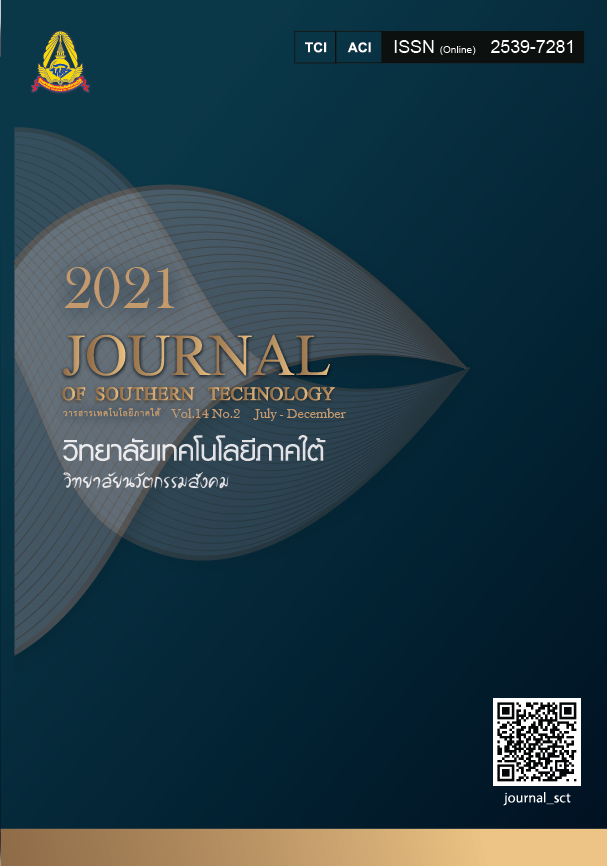Development of Health Tourism Personnel in Nakhon Si Thammarat
Main Article Content
Abstract
Nakhorn Si Thammarat is considered a province with its distinctive features that has the potential to be developed as health tourism destinations in the upper south of the country. This can be done through strengthening in all aspects especially its relevant personnel. High potential employees is the main indicator of success in health torism. Nevertheless, previous empirical research which deeply examines these individuals is not substantial for setting a new policy and planning for personnel development in line with the tourist needs. This will be the first study which deeply explores this group. This is a mixed-method research which integrates both quantitative and qualitative methods of inquiries. It seeks to 1) explore types, qualifications, personality competencies of health tourism personnel in Nakhon Si Thammarat, and
2) create a training course to develop their potentials. Quantitative data were obtained through a questionnaire which was given to 400 tourists/ customers who were selected by accidental sampling. Qualitative data were collected through in-depth interviews with 15 policymakers, representatives from public and private tourism sectors; and focus group interviews with other 7 academics to elicit information regarding forms, patterns of the newly developed course for training in the course of the study. These informants were purposely selected. Then, 20 among them were recruited to participate in the training. Statistical analysis was conducted for quantitative data including frequency, mean, standard deviation, t-test, and effectiveness index (EI). Content analysis was done for qualitative data from in-depth interviews and focus group discussions.
Results show that health tourism personnel can be divided into two levels. The first is management level which includes investors and managers. They possess vital qualifications such as the ability to communicate in Thai and Foreign languages, ability to make an operation plan, and also ability to create the marketing plan. The second type is functional level which includes the therapists and receptionists. Their main qualifications are having the ability to communicate in Thai and Foreign languages, having specific knowledge for treatment, and giving information and ability to solve the problem effectively. Results of the critical core competency are the desire to serve without showing irritability and keeping customer information secure. The critical generic competency includes delivering information on products and services and having adequate knowledge of forbidden regulations and concerns for customers with different religions and cultures. The functional competency deals with skills and ability to deliver service correctly, choose the safest products for the treatment and book and amend service correctly. The training curriculum was developed by using the data from research results earlier. After conducting the focus group discussions with a group of experts, it was found that the course content is consistent and appropriate to use as a model. The training course covers four topic areas, namely 1) reaching the perfect customer service mindset, 2) English for spa receptionist and therapist, 3) performing first-aid, and 4) providing service using exotic local herbal remedies. The assessment result of training showed that the volunteer trainees had increased their knowledge and indicated that the volunteer trainees’ satisfaction with the training program was at the highest level, in all aspects be it about the contents or the trainer.
Article Details
-
Authors must agree to the journal publication rules and allow the editors to edit the manuscripts for publication.
-
Author’s right belongs to the author but Journal of Southern Technology holds the right of first publication and thus allow readers to use the article for the purpose of education but not commercial.
References
Buchner, D., Snelling, A., & Cohen, M. (2008). Spa-relate education and training. In (M. Cohen &, G. Bodeker Eds.), Understanding the Global Spa Industry: Spa Management. UK: Elsevier/ Butterworth-Heinemann. 394-413.
Chachonnani, N. (2002). Human Resource Management. Bangkok: SE-ED Book Center. [in Thai]
Chanin, O., Phooma, J., Chan-in, P., Suttara, R., Sananut, P., & Sriprasert, P. (2011). Guidelines for Developing Management System for Sustainable Tourism Industry in Nakhon Si Thamarat (Research Report). Bangkok: The Thailand Research Fund (TRF). [in Thai]
Chan-o-cha, P. (2016). Return Happiness to the People of the Country. July 2016, 8.15 pm. The Television Pool of Thailand. p 6 [in Thai]
Chutimataewin, J. (1999). Training Development. Bangkok: P.A. Living. [in Thai]
Issariyapat, J., Polsarum, P., Techasermsukkul, L., & Chompoothip, S. (2013). Promoting Factors of Thai Wellness Tourism to be Tourism Industrial Hub (Research Paper). Bangkok: Office of Small and Medium Enterprises Promotion (OSMEP). [in Thai]
Jantaro, O., Longprasert, S., & Changkid, N. (2016). Spa Guests’ behavior towards spa service selection in Surat Thani Province. Suratthani Rajabhat Journal, 3(1), 185-205. [in Thai]
Laoharawe, W., & Esichaikul, R. (2010). Job Competencies for Day Spa Personnel in Bangkok Metropolis. In The 4th Rambhai Barni Academic Research Conference (pp.345-350). Bangkok: Rambhai Barni Rajabhat University. [in Thai]
Ministry of Tourism & Sports. (2015). Thai Tourism Strategy. Retrieved July 2, 2016, from http: // www. mots.go.th/ewt_dl_link.php?nid = 7114 [in Thai]
Parasuraman, A., Zeithaml, V. A., & Berry, L. L. (1988). SERVQUAL: A multiple-item scale for measuring consumer perceptions of service quality. Journal of Retailing, 64(1), 12–40.
Photisita, C. (2016). Science and Art of Qualitative Research (7th ed). Bangkok: Amarin Printing. [in Thai]
Pollution Control Department. (2015). Performance Summary of Pollution Control Department in Fiscal Year 2015. Ministry of Natural Resources and Environment. [in Thai]
Rodpreecha, P., & Sareerat, S. (2015). Personality, emotional intelligence, service mind and motivation related to, performance success of medium size hotels’ employees in Bangkok Metropolis. Journal of Multidisciplinary in Social Sciences, 11(3), 47-64. [in Thai]
Sukwirat, S., & Adun-phan, K. (1999). Organizational Human Resurce Development. Bangkok: Ramkhamhaeng University Press. [in Thai]
Silpjaru, T. (2006). Research and Statistical Data Analysis by SPSS. Bangkok: V. Inter Print Company Limited. [in Thai]
Tourism Economic Review. (2016). Foreign Tourist’s Satisfaction 2016. Economics Tourism and Sports Division: Ministry of Tourism and Sports. [in Thai]
Thai PBS News. (July 11, 2017). Khao Luang Nakhon Si Thammarat: The Cleanest Water Resource in Thailand. Television Station Thai PBS News. [in Thai]

